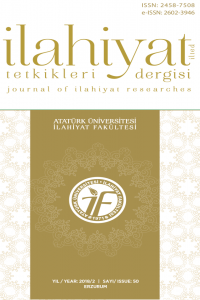Öz
Ghent
Üniversitesi öğretim üyeleri arasında yer alan Jo Van Steenbergen’in kaleminden
çıkan bu çalışma Memlûk sosyal ve politik tarihi açısından son derece
önemlidir. Müellif bu eserde genel hatlarıyla Memlûk Devleti’nin klasik devlet
teşkilatından kopmalarının akabinde ortaya çıkan siyasi boşluğun (kaos) nasıl
doldurulmaya çalışıldığını, emir-i mîe adını verdiğimiz sultandan sonra en
yetkili âmirlerin nasıl bir politik güç edindiklerini, ulema sınıfının siyaset
sınıfıyla nasıl bir ilişkisi olduğunu ve bu ilişki çerçevesinde ulema sınıfının
siyaset sınıfına nasıl bir meşruiyet sağlama gayreti içerisinde olduğunu ele
alıp tartışmıştır. Üç bölümden oluşan eserde; meşru iktidar, etkin güç ve
kaosun düzensizliği hususunda ayrıntılı bilgiler verilmiştir. Müellif öncelikle
meşru iktidardan ne anladığını dönemin kaynakları aracılığıyla ifade ederek,
Memlûk devlet geleneğinde kölemenlerin (memlûk) yerinin ne olduğunu, Mısır
özelinde nasıl bir değerleri olduğunu ve bu askerlerin zamanla iktidarı mutlak
anlamda ele geçirmeleriyle birlikte halk üzerinde nasıl bir meşruiyet
sağladıklarını tartışmıştır. Bu çerçevede Steenbergen, kölemenlerin Memlûk Devleti’ndeki
tarihçesine kısaca değinerek, onların Salih Eyyûb (ö. 1249) tarafından orduya alınıp
“seçkin” bir asker yapıldıklarını izah etmeye çalışmıştır. Ardından Bahrî
memlûklerin iktidarı ele geçirmede nasıl bir rol oynadığını, bir taraftan
Moğollarla diğer taraftan da Frenklerle mücadele ederek halk tarafından nasıl
kabul edildiklerini ele almıştır. Bu noktada müellife göre ilk etapta sadece
“hükümdarın koruyucuları” olarak anılan Bahrî memlûkleri, Frenk ve Moğollarla
yaptıkları başarılı savaşlar neticesinde “İslâm’ın koruyucuları” olarak anılmış
ve kabul edilmişlerdir. Steenbergen’e göre memlûk/kölemen hizipleri kurulmadan
bir emirin ya da sultanın hâkimiyetinden söz edilemez. Dönemin seçkin emirleri
tarafından kurulan hizipleşmeleri harekete geçiren şey; hâmilik, (patronage)
nimet elde etme (tayin-terfi/ikta) ve makbulü’l-kelime olma arzusuydu. Her
hizip hâkimiyet kurmak için birbirleriyle mücadeleye girmekten geri
kalmamıştır.
Anahtar Kelimeler
Kaynakça
- Jo Van Steenbergen, Order Out of Chaos: Patronage, Conflict And Mamluk Socio-Political Culture 1341-1382, Brill, Leiden 2006
Öz
The
work of Jo Van Steenbergen, one of the lecturers of the University of Ghent, is
extremely important in terms of Mamluk's social and political history. In this
work the writer explains in general how the political void (chaos) arising in
the wake of the breakup of the Mamluk state from the classical state
organization is filled, how the political authority of the most authoritarian
rulers after the sultan who gave his name to the emir-i mîe, and discussed how
the class of ulema in the context of this relationship is striving to provide
legitimacy to the political class. In the work composed of three parts;
detailed information on legitimate power, effective force and disorder of
chaos. The author first discussed what he understood from the legitimate power
through the sources of the time and discussed what the place of the humans in
the Mamluk state tradition is, what kind of values they have in
Egypt and how they have provided legitimacy to the people in time with their
absolute seizure of power. In this context, Steenbergen touched briefly on the
history of the Mamluks in the state and tried to explain that they were made
army by Salih Ayyub (d.1249) and they were also made an "elite"
soldier. Then, he dealt with Bahrî mamluks how the people (Mamluks) played a
role in conquering power and how they were accepted by the people, fighting
against the Mongols on one side and the Frenkles on the other. At this point,
according to the author, Bahrî mamluks, which were only called "guardians
of the monarch" in the first place, were recognized and accepted as
"protectors of Islam" as a result of the successful wars they had
with Frenk and Mongols. According to Steenbergen, it is impossible to speak of
the dominance of an emir or sultan before the establishment of the
civil/monarchical lines. What drives the factionalities established by the
elite emir of the turn; patronage, to obtain blessings (designation-promotion /
ikta), and wanted to be makbulu’l-kalim (cretitable). Each faction is not back
from entering the fight with each other to establish dominion.
Kaynakça
- Jo Van Steenbergen, Order Out of Chaos: Patronage, Conflict And Mamluk Socio-Political Culture 1341-1382, Brill, Leiden 2006
Ayrıntılar
| Birincil Dil | Türkçe |
|---|---|
| Konular | Din Araştırmaları |
| Bölüm | Kitap Değerlendirmeleri |
| Yazarlar | |
| Yayımlanma Tarihi | 31 Aralık 2018 |
| Gönderilme Tarihi | 28 Temmuz 2018 |
| Yayımlandığı Sayı | Yıl 2018 Sayı: 50 |


